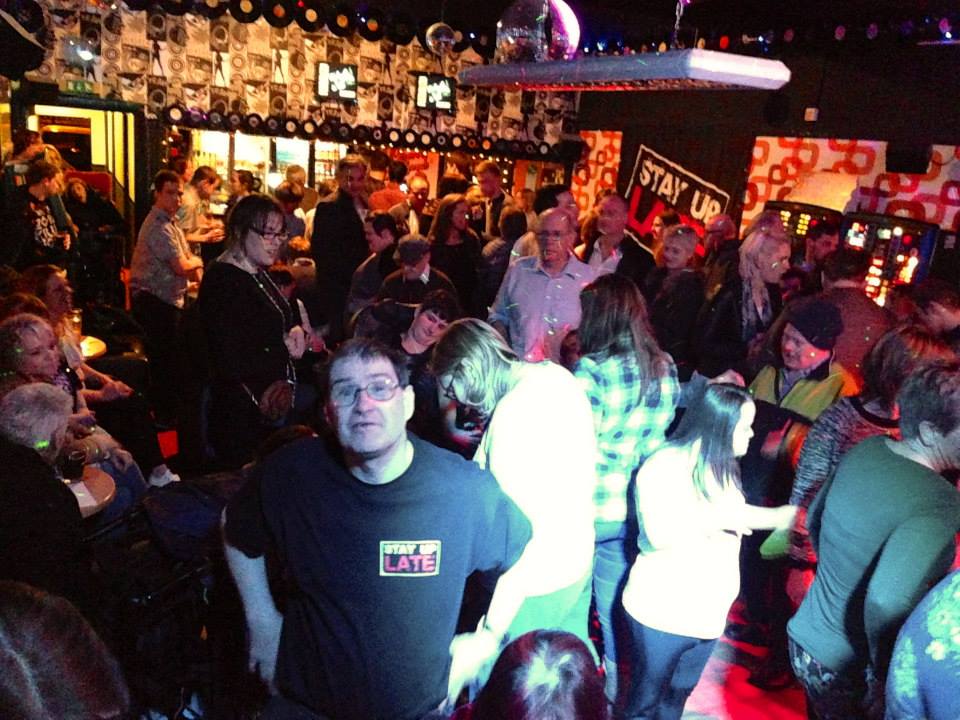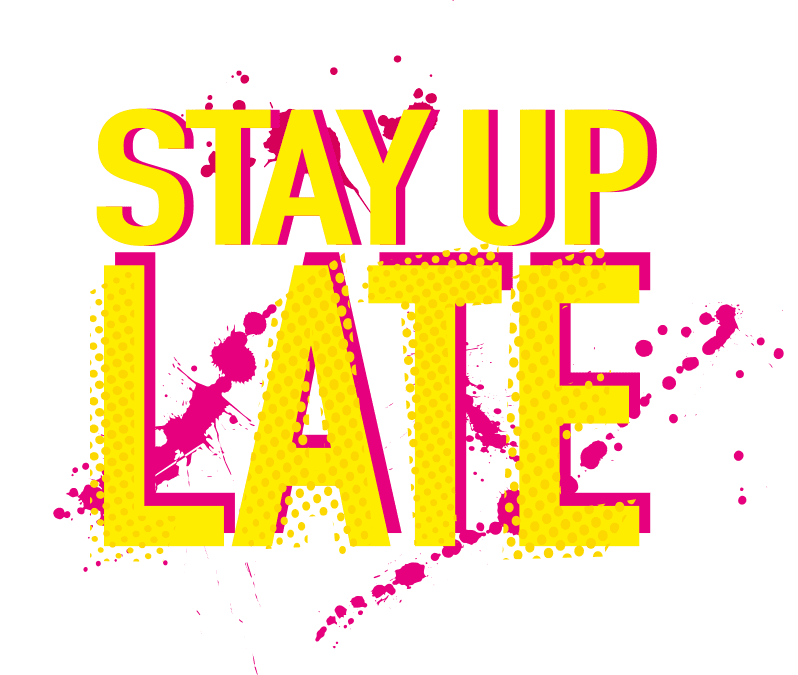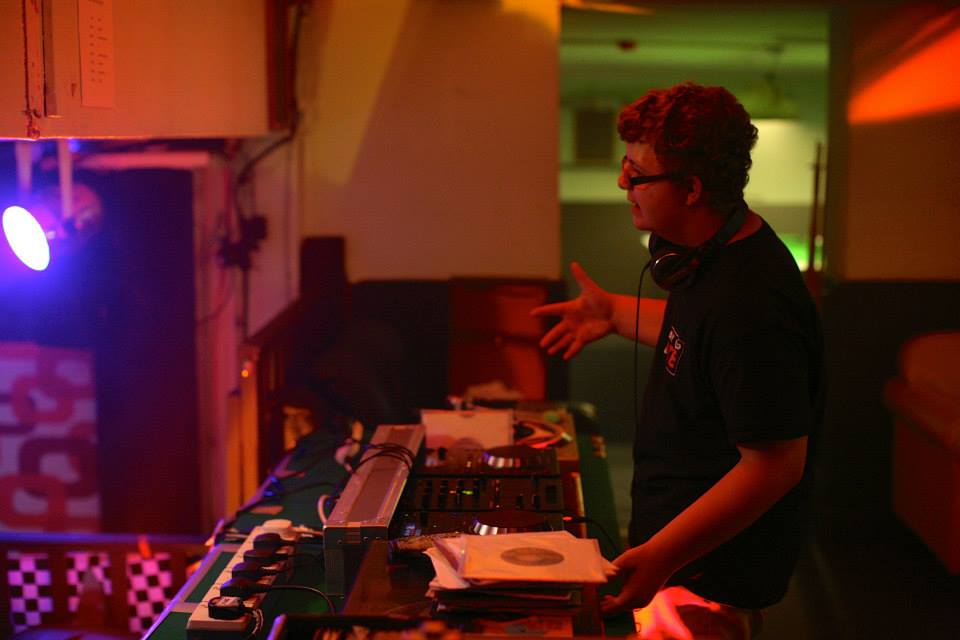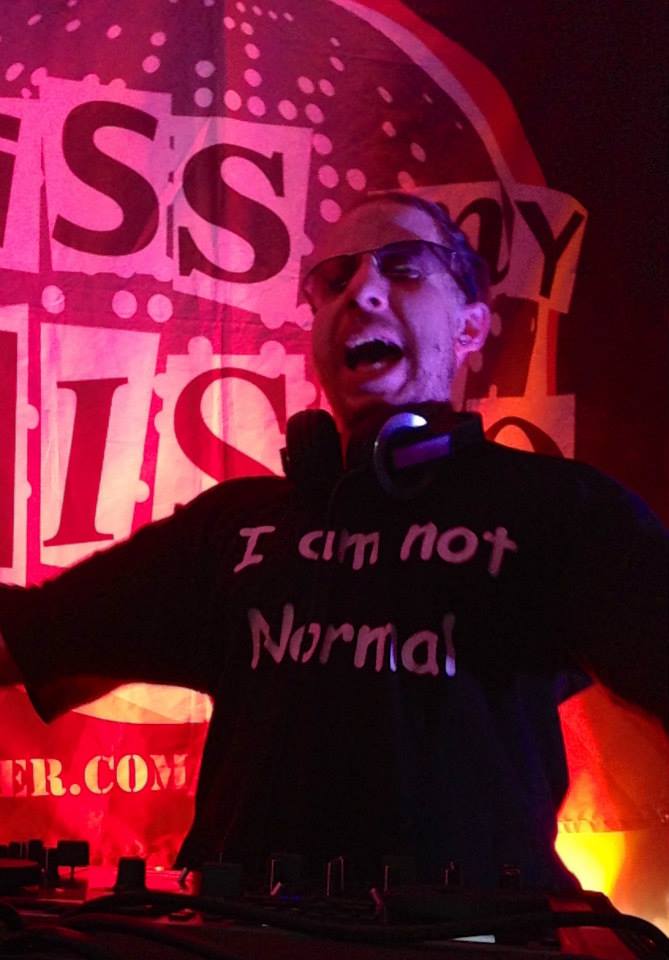
Our tips for running a club night
Recently we’ve been made aware of a disco opening up for people at lunchtimes so as to work round the usual 9pm exodus. I have no idea how successful these events are but come on who goes out clubbing at lunch time?
Stay Up Late started because we wanted to promote the rights of people with learning disabilities to enjoying full and active social lives, and to get support staff to think differently and creatively about the way they support people. Organising a lunch time disco is about as far away from our original vision as we can imagine, a truly ‘medical model’ response to the problem, instead of changing the system we just expect people to conform to the existing system.

This blog post is to share some of the lessons we’ve learned through running our Kiss My Disco club nights and hopefully enable people to see that with a bit of planning it’s quite easy to run your own nights and create more opportunities for people with learning disabilities to Stay Up Late.
When we started our Kiss My Disco nights with Nick at Freshtrack DJ workshops the idea was to create a low budget night that was run by people with learning disabilities but open to everyone.
We also wanted to try and move on the idea of ‘inclusive club nights’ but want to be clear that we’re not trying to knock these nights, there’s loads of brilliant ones which have been running for years and offer an environment where people can feel safe and meet their friends, but we reckon too that we should be trying to move things on if we want to create communities where people with learning disabilities are fully involved.
Our aim was to create a relaxed night run by DJs with learning disabilities and open to everyone encouraging people without learning disabilities to join in the fun, drawing inspiration from the amazing work done by Heart N Soul at their Beautiful Octopus nights at the South Bank but working on a very tight budget.
When we set up the nights there were some key things we decided to set out to try and achieve around the nights to make sure they ran in a way that we felt promoted our aims as a charity, and those of Freshtrack. So we set ourselves a few rules:
- To create a relaxed and welcoming environment where everyone feels welcome.
- The nights must be led by people with learning disabilities.
- The nights are run in mainstream venues and open to the general public.
- There’s a transparent entry price – so carers go free. We don’t think carers should be charged for enabling the person they support to access a night out.
- To keep costs down by keeping the model simple.
- Support new DJs by providing training workshops through Freshtrack.
- We give people the opportunity to Stay Up Late!
Lessons learned along the way
Our first night, before Kiss My Disco, wasn’t a great success, it was ok but we’d joined up with another local charity and it all got far too complicated. What we learned from this that it was important for us to stick to our initial vision, and to keep it simple.
Here’s our top tips for running a club night:
1. Make sure the nights are led by people with learning disabilities.
At Kiss My Disco we try and make sure all aspects are run by people with learning disabilities from the DJs performing, running the door, helping to set and pack away, and providing visuals.
We also make sure there are opportunities for people with learning disabilities to feedback on the nights by inviting feedback through our Storm and Thunder (advisory group) meetings.
If you’re starting your own nights it would also be a good idea to form a planning group and set them the task of coming up with the name for the nights.
2. Get a good venue
There’s a few things to think about when you’re looking for a venue:
- Accessibility
- Access via public transport
- Make sure there’s a bar
- Try and find somewhere that’s central and not tucked out of the way
- Cost – ideally see if you can get somewhere for free by offering a venue which might be quiet midweek the tantalising prospect of having 50+ paying guests in their premises (this often works!)
3. Keep it simple
The first night we ran, in partnership with other two other charities became too complicated, one charity was running the bar, another providing hot food which meant a lot of work but also meant it was difficult to make a surplus on the night, something you’re going to want to do if you want to keep the nights going.
You may want to add to the nights as they develop but for a simple model, which will also keep the running simple and cheap, is to just have DJs. (Live music is great but adds to the costs and set up time).
4. Work out your costs
Create a budget that takes in to account everything you need to run the night – venue costs, graphic design, printing, postage and expenses.
5. Have a transparent price on the door
Some club nights let carers in free and other advertise a small charge. In reality this charge will most likely be passed on to the person with a learning disability so if you need to charge £5 just say so. (Rather than £4, carers £1). This is something we feel passionately about and would encourage other organisations to adopt this policy.
6. Invest in quality publicity material
Employing the services of a good graphic designer needn’t cost the earth and will make all the difference when you publicise your events. If you need help in finding a good designer drop us a line and we can put you in touch with someone.
It’s also relatively cheap to get digitally printed flyers produced.

7. Spend time on your publicity
A club night won’t be much fun for everyone if nobody turns up so you’ll need to spend time building your mailing list, gathering addresses of local support providers, advocacy groups, carers networks etc and also thinking about places specific to your locality (student unions, college etc).
We also devised a tick-list of all the places that we needed to advertise (local press, what’s on guides, disability groups etc). Don’t forget to also cater to those people who aren’t online and get paper flyers printed.
8. Build consistency and plan ahead
Ideally you’ll need at least a 6 week lead-in before your night which will enable you to get flyers printed and distributed, as well as all your other publicity activity. And if you can have the leaflets for your next night available on the door to hand out as people leave.
9. Get active on social media
We’re always happy to share details of club nights but it can make it difficult if you don’t have social media platforms. So we’d say make sure you get your events up on Facebook and Twitter, and tag us in your tweets and posts so we can re-tweet and share.
We’re also happy to post details of any events on our listings on this site.
10. Get some gear (if you can afford it)
Between us and Freshtrack we were able to provide DJ decks, speakers and lights and if you can its worth investing in these as it opens up the possibilities for places where you can run your nights. A basic set up would set you back around £2000 and would include:
- Powered PA speakers (Mackie 500Watt speakers will do the job nicely)
- CD decks
- Some lighting
- Some printed banners to dress the room
Some venues will have access to the gear you need but may well charge a hire fee.
11. Keep it relaxed
Sometimes we get asked if our nights are ‘autism friendly’. As everyone is different we can’t say our nights are deliberately autism ‘friendly’ or not but we always aim to make the atmosphere relaxed and welcoming so that everyone feels able to have a great time.
12. Stay Up Late!
As a charity we’re all about promoting full and active social lives and get so frustrated at seeing floods of people leave events at 9pm. We’ve not cracked this problem yet but we’re going to be announcing some plans shortly to develop our campaigning work and we’d like to see accessible club nights as one way of furthering our aims. So don’t settle for people leaving in droves at 9pm.
So hopefully thus will give you a few tips and pointers on how to run your own nights. We’d love to see more and more nights popping up to enable people with learning disabilities to lead full and active social lives and would love to hear what you’re planning so we can share your news via this website.



